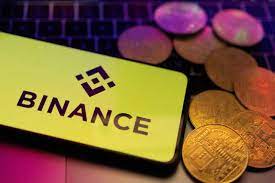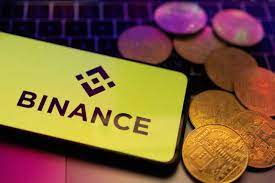
Market data indicated that investors withdrew over $956 million from cryptocurrency exchange Binance in the last 24 hours following the resignation of its CEO, Changpeng Zhao, and his potential imprisonment following his guilty plea on Tuesday to resolve an extensive U.S. investigation into illicit funding.
The agreement, which calls for Binance to pay US authorities $4.3 billion, casts doubt on the viability of the biggest cryptocurrency exchange in the world and deals a further blow to an already scandal-plagued sector. Richard Teng, a senior official at Binance who arrived in 2021, has taken Zhao's post, the business announced.
Zhao was the creator and largest shareholder of Binance, thus it was unknown how much influence he would have over the company going forward and how much jail time, if any, he would really serve.
Analysts also pointed out that the transaction was not likely to fix the exchange's legal issues in the United States, as claims by the Securities and Exchange Commission that Binance violated securities laws in the country remain unresolved.
"Binance is not entirely out of the woods. The ongoing civil lawsuit with the SEC remains a concern for the exchange, which (is) likely to result in further fines," wrote Robert Le, a crypto analyst at data firm PitchBook.
Bitcoin flows are not included in the data from the crypto analytics platform Nansen, but it does indicate that some investors were alarmed by the news and withdrew $956 million from the exchange. However, according to Nansen, the withdrawals were negligible in comparison to the more than $65 billion in assets that are still on Binance.
Authorities claimed that Binance avoided important checks that Zhao thought would alienate users in its quest for market supremacy.
More than 100,000 questionable transactions went unreported, including those with groups the US designated as terrorists, like the Palestinian militant organisation Hamas. Transactions with websites that sold materials for child sexual abuse were also never reported.
While not making any specific comment on the issues, On Tuesday, Binance announced that a lot of effort had gone into making Binance "safer and even more secure." Requests for comment from Zhao's solicitors went unanswered. On Tuesday, he conceded "I made mistakes, and I must take responsibility."
Although Zhao and Binance have been under investigation by regulators since at least 2018, Zhao's departure represents a significant change for one of the most influential people in the cryptocurrency space. In a Seattle court on Tuesday, Zhao, a resident of the United Arab Emirates (UAE), entered his plea.
According to federal standards, he faces a maximum jail sentence of eighteen months, and he has consented not to appeal any sentence up to that duration. A Justice Department official stated on Wednesday that prosecutors will decide how much jail time to seek closer to Zhao's sentencing hearing in Seattle on February 23.
"But we do reserve the right to seek a sentence above the guidelines."
According to a court filing, Zhao posted a $175 million bail bond, with an additional $15 million being held in a trust account. Fourteen days prior to his punishment, he has consented to return to the United States.
It was not possible to immediately determine his location. Zhao's attorneys stated during the hearing on Tuesday that he would stay in the Seattle region until Monday night and then be allowed to return to the United Arab Emirates, assuming the district judge did not object to his arrangement with the government, according to a second DOJ official.
Later on Wednesday, despite Zhao's bail restrictions, federal prosecutors asked a federal judge to prevent him from leaving the country before his February sentencing, arguing in a court document that Zhao posed a substantial risk of escaping.
"There is no combination of conditions sufficient to protect against the risk of flight and ensure Zhao's return" for sentencing, the prosecutors said.
A few legal experts, citing the plea of guilty to anti-money laundering charges by Arthur Hayes, the former CEO of cryptocurrency exchange BitMEX, expressed their belief that Zhao would not serve more than a year in prison, if any.
Despite the government's request for a jail sentence, Hayes was finally sentenced to six months of home arrest in 2022. Other high-ranking BitMEX officials who were charged avoided jail time.
But Sam Bankman-Fried, the founder of FTX, may spend decades behind bars after being found guilty this month of scamming users of his now-defunct cryptocurrency exchange.
Legal experts speculate that prosecutors may have charged Zhao with more serious offences carrying longer punishments based on the alleged circumstances, but they would have had to balance that against the likelihood that he would have continued abroad to evade capture.
"To get the CEO to plead guilty should not be scoffed at," said Daniel Silva, a partner at law firm Buchalter and former federal prosecutor.
In addition, Zhao is prohibited by the settlement from "any present or future involvement in operating or managing" Binance, the company he started in 2017 and has tightly held since. He declared on Tuesday that he will be "available to the team to consult as needed, consistent" with the deal, and he is still a significant stakeholder.
"This could give him a hook on which to exercise control – through the usual corporate governance channels (e.g., shareholder voting," Yesha Yadav, a law professor at Vanderbilt University, wrote in an email to Reuters.
"At the same time, I imagine that the Binance will be looking to be very careful."
(Source:www.livemint.com)
The agreement, which calls for Binance to pay US authorities $4.3 billion, casts doubt on the viability of the biggest cryptocurrency exchange in the world and deals a further blow to an already scandal-plagued sector. Richard Teng, a senior official at Binance who arrived in 2021, has taken Zhao's post, the business announced.
Zhao was the creator and largest shareholder of Binance, thus it was unknown how much influence he would have over the company going forward and how much jail time, if any, he would really serve.
Analysts also pointed out that the transaction was not likely to fix the exchange's legal issues in the United States, as claims by the Securities and Exchange Commission that Binance violated securities laws in the country remain unresolved.
"Binance is not entirely out of the woods. The ongoing civil lawsuit with the SEC remains a concern for the exchange, which (is) likely to result in further fines," wrote Robert Le, a crypto analyst at data firm PitchBook.
Bitcoin flows are not included in the data from the crypto analytics platform Nansen, but it does indicate that some investors were alarmed by the news and withdrew $956 million from the exchange. However, according to Nansen, the withdrawals were negligible in comparison to the more than $65 billion in assets that are still on Binance.
Authorities claimed that Binance avoided important checks that Zhao thought would alienate users in its quest for market supremacy.
More than 100,000 questionable transactions went unreported, including those with groups the US designated as terrorists, like the Palestinian militant organisation Hamas. Transactions with websites that sold materials for child sexual abuse were also never reported.
While not making any specific comment on the issues, On Tuesday, Binance announced that a lot of effort had gone into making Binance "safer and even more secure." Requests for comment from Zhao's solicitors went unanswered. On Tuesday, he conceded "I made mistakes, and I must take responsibility."
Although Zhao and Binance have been under investigation by regulators since at least 2018, Zhao's departure represents a significant change for one of the most influential people in the cryptocurrency space. In a Seattle court on Tuesday, Zhao, a resident of the United Arab Emirates (UAE), entered his plea.
According to federal standards, he faces a maximum jail sentence of eighteen months, and he has consented not to appeal any sentence up to that duration. A Justice Department official stated on Wednesday that prosecutors will decide how much jail time to seek closer to Zhao's sentencing hearing in Seattle on February 23.
"But we do reserve the right to seek a sentence above the guidelines."
According to a court filing, Zhao posted a $175 million bail bond, with an additional $15 million being held in a trust account. Fourteen days prior to his punishment, he has consented to return to the United States.
It was not possible to immediately determine his location. Zhao's attorneys stated during the hearing on Tuesday that he would stay in the Seattle region until Monday night and then be allowed to return to the United Arab Emirates, assuming the district judge did not object to his arrangement with the government, according to a second DOJ official.
Later on Wednesday, despite Zhao's bail restrictions, federal prosecutors asked a federal judge to prevent him from leaving the country before his February sentencing, arguing in a court document that Zhao posed a substantial risk of escaping.
"There is no combination of conditions sufficient to protect against the risk of flight and ensure Zhao's return" for sentencing, the prosecutors said.
A few legal experts, citing the plea of guilty to anti-money laundering charges by Arthur Hayes, the former CEO of cryptocurrency exchange BitMEX, expressed their belief that Zhao would not serve more than a year in prison, if any.
Despite the government's request for a jail sentence, Hayes was finally sentenced to six months of home arrest in 2022. Other high-ranking BitMEX officials who were charged avoided jail time.
But Sam Bankman-Fried, the founder of FTX, may spend decades behind bars after being found guilty this month of scamming users of his now-defunct cryptocurrency exchange.
Legal experts speculate that prosecutors may have charged Zhao with more serious offences carrying longer punishments based on the alleged circumstances, but they would have had to balance that against the likelihood that he would have continued abroad to evade capture.
"To get the CEO to plead guilty should not be scoffed at," said Daniel Silva, a partner at law firm Buchalter and former federal prosecutor.
In addition, Zhao is prohibited by the settlement from "any present or future involvement in operating or managing" Binance, the company he started in 2017 and has tightly held since. He declared on Tuesday that he will be "available to the team to consult as needed, consistent" with the deal, and he is still a significant stakeholder.
"This could give him a hook on which to exercise control – through the usual corporate governance channels (e.g., shareholder voting," Yesha Yadav, a law professor at Vanderbilt University, wrote in an email to Reuters.
"At the same time, I imagine that the Binance will be looking to be very careful."
(Source:www.livemint.com)





